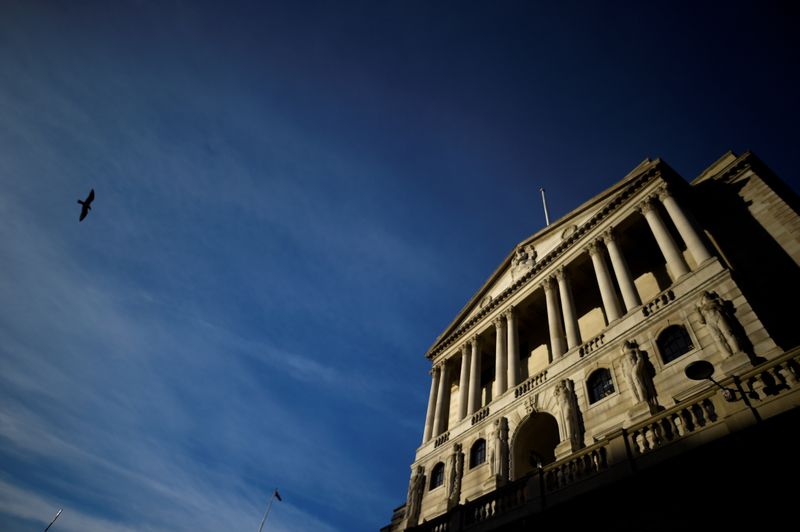By William Schomberg and David Milliken
LONDON (Reuters) - The Bank of England kept interest rates steady on Thursday, saying it was too soon to gauge how much Prime Minister Boris Johnson's election victory would lift the Brexit uncertainty that has hung over the economy.
Two of the BoE's nine policymakers voted for a second month in a row for a cut to borrowing costs due to fears that Britain's jobs boom is deteriorating.
But the majority took a wait-and-see approach at the penultimate rate-setting meeting for Governor Mark Carney, who is due to stand down on Jan. 31.
"There was no evidence yet about the extent to which policy uncertainties among companies and households had declined following recent domestic policy developments," the BoE said in a statement.
Sterling rose and British government bond prices fell on the news that no further BoE policymakers had backed a rate cut.
"Effectively the Monetary Policy Committee has taken some heart from developments over the past month or so, namely that the outlook for Brexit now looks a bit clearer," Philip Shaw, an economist with Investec, said.
The BoE also thought the prospects for the global economy had improved as it noted a "partial de-escalation" of the U.S.-China trade tensions.
But Shaw said a BoE rate hike over the next year looked very unlikely.
After Johnson's emphatic election win last week, Britain is on course to leave the European Union on Jan. 31 with a transition deal, which the BoE said could reduce some of the immediate uncertainty hovering over businesses.
But many companies are already looking to the end of 2020, when they will face tariffs on exports to the EU unless Johnson succeeds in negotiating a trade deal before then - or breaks his word and allows an extension to the transition period.
7-2 SPLIT
At this week's BoE meeting, policymakers Michael Saunders and Jonathan Haskel once again voted to cut rates, saying the central bank needed to move quickly to respond to signs that Britain's robust job market was faltering.
For the seven others, it was too soon to take action. Economic growth was expected to pick up in early 2020 thanks to the easing of Brexit uncertainty, higher spending by the government and a recovery in global economic growth, they said.
"If global growth failed to stabilize or if Brexit uncertainties remained entrenched, monetary policy might need to reinforce the expected recovery in UK GDP growth and inflation," the statement said.
But further ahead, the BoE said it might need to raise borrowing costs "at a gradual pace and to a limited extent" if those risks did not materialize and the economy grew as expected.
Last month the BoE forecast Britain's economy would grow by just 1.2% next year, the weakest annual expansion since the global financial crisis.
On Thursday it cut its forecast for quarterly growth in the final three months of 2019 to 0.1% from 0.2%.
The BoE said there were further signs that Britain's recently booming jobs market was going off the boil, but unit labor costs were still growing at a pace that could push up inflation by more than it wants.
A small amount of excess supply had widened in the broader economy as companies were operating below full capacity.
Inflation is currently running below the BoE's 2% target at 1.5%. But a handful of economists think the central bank could raise rates next year due to underlying pressures from the tight labor market and damage to productive capacity from Brexit.

Most, though, think a rate cut is more likely and financial markets have been pricing in a roughly 50% chance of a single 25 basis-point rate cut before the end of 2020. That probability fell slightly after Thursday's announcement.